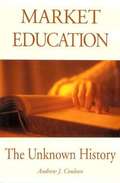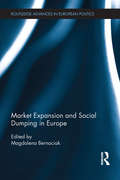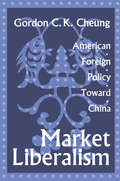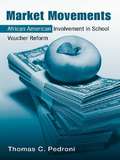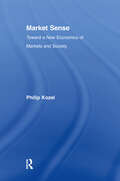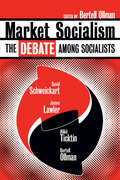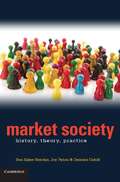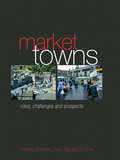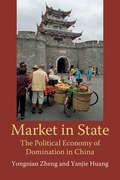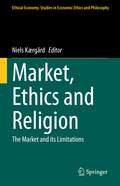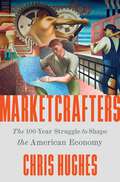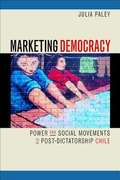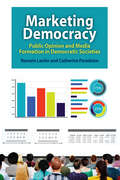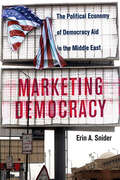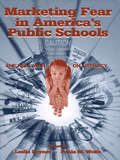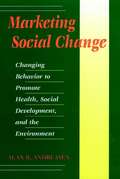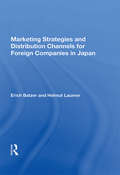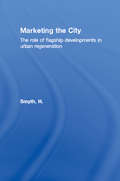- Table View
- List View
Market Economy and Urban Change: Impacts in the Developing World
by Mohamed Hamza Roger ZetterAcross the developing world the preceding decade or so has witnessed a profound reconfiguration of the political economy of urban policy. This new policy environment is driven by globalization, the neo-liberal macro-economic package of 'market enablement' and structural adjustment, which now form the dominant development paradigm. The consequences of this approach for urban development agendas and ultimately the lives and livelihoods of millions of people across the globe are profound. Market Economy and Urban Change explores and evaluates urban sector and development policies in the context of market enablement, and the associated instruments of structural adjustment, urban management reform and 'good' governance. By articulating the linkages between this neo-liberal development paradigm and the way different actors in the urban sector enact policy responses, the book provides an understanding of both the factors driving market enablement, and its impacts on urban sector policies and programmes. With case studies drawn from countries such as Egypt, Mexico, Kenya, Brazil, Colombia and transitional economies, the book focuses in particular on the implications for land, shelter and related sectoral policies for poverty alleviation. By linking policy to practice, the book seeks to inform policy-makers in governments, donor and implementing agencies of the impact of shifts in the development debate on urban sector strategies.
Market Education: The Unknown History (Studies in Social Philosophy & Policy, No. #21)
by Andrew J. CoulsonCoulson concludes that free educational markets have consistently done a better job of serving the public's needs than state-run school systems have. (from the publisher)
Market Expansion and Social Dumping in Europe (Routledge Advances in European Politics)
by Magdalena BernaciakThe term ‘social dumping’ regularly appears in public debates and in policymaking circles. However, due to its ambiguity it is used in a manner that is convenient for individual discourse participants, thus opening the door for misconceptions and ill-grounded accusations. This book systematically examines social dumping in the context of the European integration process. It defines social dumping as the practice, undertaken by self-interested market participants, of undermining or evading existing social regulations with the aim of gaining a competitive advantage. It also shows how the two major EU integration projects the creation of the Internal Market, and EU enlargement to the east and to the south have provided market actors with new incentives and opportunities to contest existing social ‘constraints’. The empirical chapters examine social dumping practices accompanying labour migration, employee posting and cross-border investment distribution. In addition, they outline the process of formation of social standards and trace initiatives at EU and national levels that contribute to the spread of social dumping in Europe. This book will be of interest to scholars and students of employment relations, EU studies, international political economy, globalisation studies, welfare studies, social policy and migration studies.
Market Justice
by Brent Z. KaupMarket Justice explores the challenges for the new global left as it seeks to construct alternative means of societal organization. Focusing on Bolivia, Brent Z. Kaup examines a testing ground of neoliberal and counter-neoliberal policies and an exemplar of bottom-up globalization. Kaup argues that radical shifts towards and away from free market economic trajectories are not merely shaped by battles between transnational actors and local populations, but also by conflicts between competing domestic elites and the ability of the oppressed to overcome traditional class divides. Further, the author asserts that struggles against free markets are not evidence of opposition to globalization or transnational corporations. They should instead be understood as struggles over the forms of global integration and who benefits from them.
Market Liberalism: American Foreign Policy Toward China
by Gordon CheungThis study analyzes the overseas effect of the market force of US foreign policy toward China. Gordon Cheung puts forward the idea of "augmented market liberalism", arguing that the US was instrumental in making China a market economy.
Market Movements: African American Involvement in School Voucher Reform (Critical Social Thought)
by Thomas C. PedroniWinner of the 2009 Critics Choice Book Award of the American Educational Studies Association (AESA) Through careful ethnographic research, Market Movements represents community leaders, school officials, and most importantly, African American working class families who have used vouchers as a means of removing their children from public schools they deemed unacceptable. The book works to discern the overlaps and tensions between the educational visions of African American voucher families and those of powerful conservative educational forces in U.S. society which purport to be allied with them. To the extent that there are points of divergence with the educational right, and points of convergence with educational progressives, this book provides a hopeful message and a practical vision. It seeks to accomplish some of the critical empirical and conceptual groundwork that is necessary in order to renew the increasingly fractious relations between those social actors—teachers, communities of color, critical researchers, and labor unions—most likely to defend and expand previous social democratic victories.
Market Sense: Toward a New Economics of Markets and Society (New Political Economy)
by Philip KozelThis book concentrates upon the historic associations of the marketplace in the work of Aristotle, Adam Smith, Karl Marx, and demonstrates how what markets were imagined to entail for society was critical to each author's understanding of the central social problems of their time.
Market Socialism: The Debate Among Socialist
by David Schweickart Bertell Ollman James Lawler Hillel TicktinFirst Published in 1998. Routledge is an imprint of Taylor & Francis, an informa company.
Market Society
by Benjamin Spies-Butcher Joy Paton Damien CahillMarket Society: History, Theory, Practice explores the social basis of economic life, from the emergence of market society in feudal England to the complex and interwoven markets of modern capitalist society. This lively and accessible book draws upon a variety of theories to examine the social structures at the heart of capitalist economies. It considers how capitalism is constituted, the institutions that regulate economic processes in market society and the experience of living in contemporary market societies. Market Society: History, Theory, Practice provides students of both political economy and economic sociology with a more nuanced understanding of how markets and people interact and how this relationship has influenced the nature and structure of modern economies.
Market Towns: Roles, challenges and prospects
by Neil PoweOriginal and insightful, this volume, giving in-depth consideration to the key issues affecting the future of market towns, provides readers with a framework for evaluating policy initiatives and progress in market towns.Through a detailed analysis of the characteristics of over 200 towns and in-depth studies of eleven towns in different parts of E
Market in State: The Political Economy of Domination in China
by Yongnian Zheng Yanjie HuangFocusing on the evolving relations between the state and market in the post-Mao reform era, Yongnian Zheng and Yanjie Huang present a theory of Chinese capitalism by identifying and analyzing three layers of the market system in the contemporary Chinese economy. These are, namely, a free market economy at the bottom, state capitalism at the top, and a middle ground in between. By examining Chinese economic practices against the dominant schools of Western political economy and classical Chinese economic thoughts, the authors set out the analytical framework of 'market in state' to conceptualize the market not as an autonomous self-regulating order but part and parcel of a state-centered order. Zheng and Huang show how state (political) principles are dominant over market (economic) principles in China's economy. As the Chinese economy continues to grow and globalize, its internal balance will likely have a large impact upon economies across the world.
Market, Ethics and Religion: The Market and its Limitations (Ethical Economy #62)
by Niels KærgårdThis book deals with the basic question of what money can and cannot buy and offers an analysis of the limitations of the market mechanism. Few concepts are as controversial as religion and the market mechanism. Some consider religion to be in conflict with a modern rational scientific view of life, and thus as a contributory cause of harsh conflicts and a barrier to human happiness. Others consider religious beliefs as the foundation for ethics and decent behaviour. Similar, a number of neoliberal writers acclaimed the market mechanism as one of the greatest triumphs of the human mind, and saw it as the main reason why rich countries became rich. Others are extremely skeptical and stress how this mechanism has result in big multinational firms with powerfully rich owners and masses of poor low-paid workers. Researchers from various fields - economists, social scientists, theologians and philosophers - handle these questions very differently, applying different methods and different ideals. This book offers a synthesis of the different viewpoints. It deals with economists’, theologians’ and philosophers’ differing thoughts about the market and its limitations.
Marketcrafters: The 100-Year Struggle to Shape the American Economy
by Chris HughesA revelatory and unexpected history of the rise of American capitalism—and an argument that entrepreneurial leaders in government, not the mythical &“free market,&” created the most dynamic economy the world has ever known.For many decades, a sacred myth has ruled the minds of policymakers and business leaders: free markets, untouched by the soiled hands of government, bring us prosperity and stability. But it&’s wrong. American policy makers, on the right and the left, have spent much of the past century actively shaping our markets for social and political goals. Their work behind the scenes and out of the headlines has served as a kind of &“marketcraft,&” resembling the statecraft of international relations. Economist and writer Chris Hughes takes us on a journey through the modern history of American capitalism, relating the captivating stories of the most effective marketcrafters and the ones who bungled the job. He reveals how both Republicans and Democrats have consistently attempted to organize markets for social and political reasons, like avoiding gasoline shortages, reducing inflation, fostering the American aviation and semiconductor industries, fighting climate change, and supporting financial innovation. In recent decades, the art of marketcraft has been lost to history, replaced by the myth that markets work best when they are unfettered and free. Hughes argues that by rediscovering the triumphs and failures of past marketcrafters, we can shape future markets, such as those in artificial intelligence and clean power production, to be innovative, stable, and inclusive. Groundbreaking, timely, and illuminating, this is a must-read for anyone interested in economic policy, financial markets, and the future of the American economy.
Marketing Democracy: Power and Social Movements in Post-Dictatorship Chile
by Julia PaleyMarketing Democracy shows how the exercise of power and the strategies of social movements transformed with the transition from a military to an elected-civilian regime in Chile. The term "marketing democracy" refers first to how contemporary democracies are shaped by transnational market forces, and second to how politicians have promoted democracy with the twin goals of attracting foreign capital and diminishing social movements.
Marketing Democracy: Public Opinion and Media Formation in Democratic Societies
by Catherine Paradeise Romain LauferThis book examines mass marketing techniques in a political rather than economic context. The authors' thesis remains persuasive: democratic politics, precisely because it requires mass support for its legitimation, increases the need for public opinion to be channelized and focused. This is precisely the task of marketing in the political process.Increasingly, advanced societies are involved in symbolic rather than direct forms of struggle. As a result, management of ideas becomes crucial to both political survival and economic expansion. Romain Laufer and Catherine Paradeise argue that public opinion and media formation is built into the fabric of Western political culture, dating from the Sophists in ancient Greece through Machiavelli in the aristocratic baronies of pre-capitalist Europe. With the rise of the bureaucratic-administrative state in the West, the need for persuasive public opinion analysis became part of the fabric of the advanced Western democratic and capitalist nations.The volume benefits from authors trained and familiar with the traditions of both the United States and Europe. They are able to consider contrasts in marketing styles as well as continuities of contents among advanced nation-states. No simple "how-to" manual, this bracingly different volume discusses its subject with an easy command of the philosophical and cultural literatures, as well as the major classics of economics, sociology, and political science.
Marketing Democracy: The Political Economy of Democracy Aid in the Middle East (Cambridge Middle East Studies #64)
by Erin A. SniderFor nearly two decades, the United States devoted more than $2 billion towards democracy promotion in the Middle East with seemingly little impact. To understand the limited impact of this aid and the decision of authoritarian regimes to allow democracy programs whose ultimate aim is to challenge the power of such regimes, Marketing Democracy examines the construction and practice of democracy aid in Washington DC and in Egypt and Morocco, two of the highest recipients of US democracy aid in the region. Drawing on extensive fieldwork, novel new data on the professional histories of democracy promoters, archival research and recently declassified government documents, Erin A. Snider focuses on the voices and practices of those engaged in democracy work over the last three decades to offer a new framework for understanding the political economy of democracy aid. Her research shows how democracy aid can work to strengthen rather than challenge authoritarian regimes. Marketing Democracy fundamentally challenges scholars to rethink how we study democracy aid and how the ideas of democracy that underlie democracy programs come to reflect the views of donors and recipient regimes rather than indigenous demand.
Marketing Fear in America's Public Schools: The Real War on Literacy
by Leslie Poynor Paula M. WolfeMarketing Fear in America's Public Schools: The Real War on Literacy is an eye-opening examination of the real world consequences of the political pressures and influences on teachers today. In particular, it looks at how the political actions of the conservative right disempower and control teachers, school districts, parents, and children through an atmosphere of fear used as a strategy to ensure that schools follow the conservative political agenda supporting and imposing mandates such as increased accountability, high stakes testing, and direct intense direct-instruction phonics programs. The book offers a unique look not at not only what the conservative factions are doing but why. The volume includes chapters on: *resistance to the conservative agenda; *national and/or federal agendas and actions that directly or indirectly contribute to the privatization and corporate control of public education; *the linkage of federal policy to the disappearance or promotion of particular philosophical and pedagogical approaches; and *the role of the media in perpetuating the agendas of the corporate and political right. Many teachers across the U.S. are frustrated and angry about the outside legislative constraints placed on their work, but at the same time frightened of losing their jobs and/or being faced with a lawsuit. The book's premise is that one must understand the motives behind the current educational "reforms" in order to resist them. The editors and contributors envision the volume as a voice for an alternative to compliance with unreasonable mandates--and thus as a message of hope. Marketing Fear in America's Public Schools: The Real War on Literacy is important reading for teachers; teacher educators; education students; school administrators and other education professionals; researchers concerned with literacy, critical theory, pedagogy, and educational policy; and parents and community activists concerned with the politics of schooling and school reform. It is will serve well as a text in a range of courses across the field of education. A Web site for the book can be found at http://www.erlbaum.com/poynor.
Marketing Management and Communications in the Public Sector (Masters in Public Management)
by Martial Pasquier Jean-Patrick VilleneuveThis updated edition of Marketing Management and Communications in the Public Sector provides a thorough overview of the major concepts in public sector marketing and communications, two fields that have continued to grow in importance for modern public administrations. With extended coverage of topics such as social marketing and institutional communication, the authors skilfully build on the solid foundations laid down in the previous edition. Replete with real-world case studies and examples, including new material from the USA, Australia, and Asia, this book gives students a truly international outlook. Additional features include exercises and discussion questions in each chapter and an illustrative extended case study. This refreshed text is essential reading for postgraduate students on public management degrees, and aspiring or current public managers. The Open Access version of this book, available at http://www.taylorfrancis.com/books/e/9781315622309, has been made available under a Creative Commons Attribution-Non Commercial-No Derivatives 4.0 license.
Marketing Schools, Marketing Cities: Who Wins and Who Loses When Schools Become Urban Amenities
by Maia Bloomfield CucchiaraDiscuss real estate with any young family and the subject of schools is certain to come up--in fact, it will likely be a crucial factor in determining where that family lives. Not merely institutions of learning, schools have increasingly become a sign of a neighborhood's vitality, and city planners have ever more explicitly promoted "good schools" as a means of attracting more affluent families to urban areas, a dynamic process that Maia Bloomfield Cucchiara critically examines in Marketing Schools, Marketing Cities. Focusing on Philadelphia's Center City Schools Initiative, she shows how education policy makes overt attempts to prevent, or at least slow, middle-class flight to the suburbs. Navigating complex ethical terrain, she balances the successes of such policies in strengthening urban schools and communities against the inherent social injustices they propagate--the further marginalization and disempowerment of lowerclass families. By asking what happens when affluent parents become "valued customers," Marketing Schools, Marketing Cities uncovers a problematic relationship between public institutions and private markets, where the former are used to leverage the latter to effect urban transformations.
Marketing Social Change. Changing Behavior to Promote Health, Social Development, and the Environment
by Alan R. AndreasenApplies marketing techniques to social issues.
Marketing Strategies And Distribution Channels For Foreign Companies In Japan
by Erich BatzerThis book gives an account of concrete market situations and describes marketing strategies and distribution channels of German manufacturing firms, German and foreign trading firms and Japanese partner firms on the Japanese market in important product areas.
Marketing US Foreign Policy in the MENA Region: American Presidents vs Non-State Actors (Political Campaigning and Communication)
by Fouad TouzaniThe book examines how US media, public opinion, interest groups and think tanks respond to US Presidents’ attempts to market their foreign policies in the MENA Region. The scope of the analysis extends from the war on terror to the so-called Arab Spring. It focuses on some case studies including the Arab-Israeli conflict and the Iran nuclear deal. The book fills a gap in the literature pertaining to analyzing US foreign policy in the MENA area from a political communication perspective rather than from IR or a political-theory angle, which remains the dominant literature. In so saying, the book will appeal to students, researchers as well as thinks tanks and policy makers.
Marketing Violence: The Affective Economy of Violent Imageries in the Dutch Republic (Elements in Histories of Emotions and the Senses)
by Karel Vanhaesebrouck Cornelis van der Haven Inger Leemans Frans-Willem KorstenThis Element describes the development of an affective economy of violence in the early modern Dutch Republic through the circulation of images. The Element outlines that while violence became more controlled in the course of the 17th century, with fewer public executions for instance, the realm of cultural representation was filled with violent imagery: from prints, atlases and paintings, through theatres and public spectacles, to peep boxes. It shows how emotions were evoked, exploited, and controlled in this affective economy of violence based on desires, interests and exploitation. This title is also available as Open Access on Cambridge Core.
Marketing Warfare
by Al Ries Jack Trout"A business book with a difference: clear-cut advice, sharp writing and a minimum of jargon." Newsweek "Revolutionary! Surprising!" Business Week "Chock-a-block with examples of successful and failed marketing campaigns, makes for a very interesting and relevant read." USA Today
Marketing the City: The role of flagship developments in urban regeneration
by H. SmythThis book assesses the value of flagship developments and draws out lessons for best policy and practice. It looks at marketing strategies and the sales process for flagship developments and the areas in which they are located for urban regeneration. It discusses the management of marketing strategies and the development through the policy formulation, project implementation and policy/project evaluation. The author examines the strategies to date of 'marketing the city' and the conceptual scope and limits for developing the concept. He also looks at the extent to which people can be integrated into the urban 'product' and the advantages and disadvantages of this. Finally the impact of all these issues is assessed for the policy makers, planners, developers, architects and city authorities.

